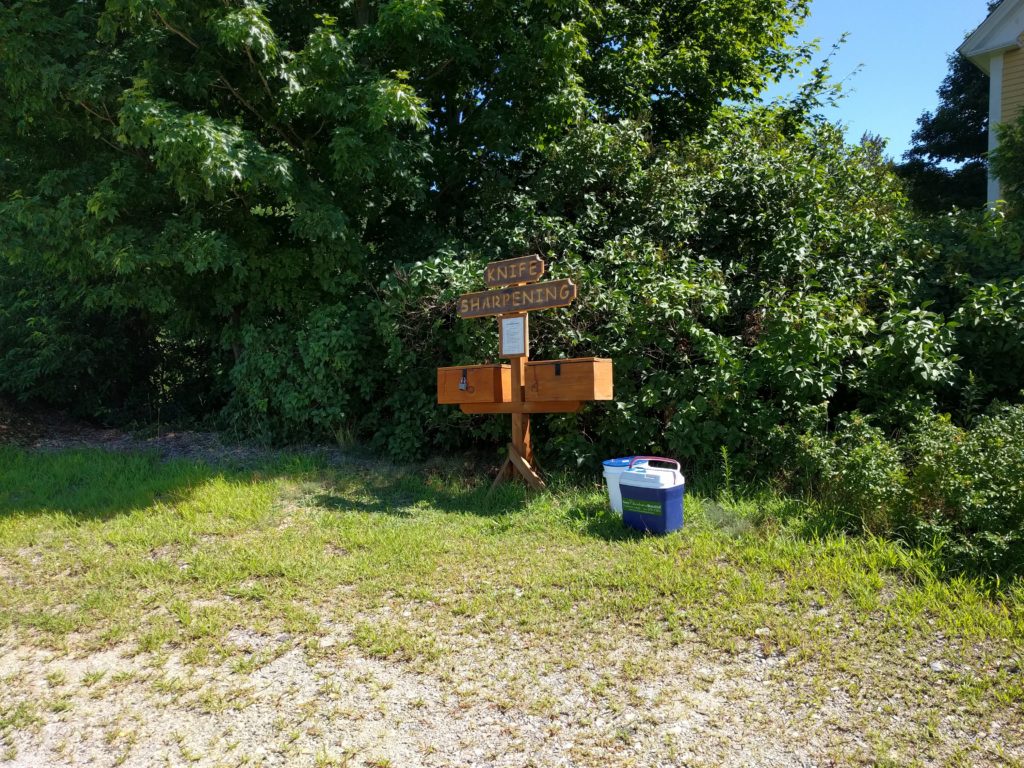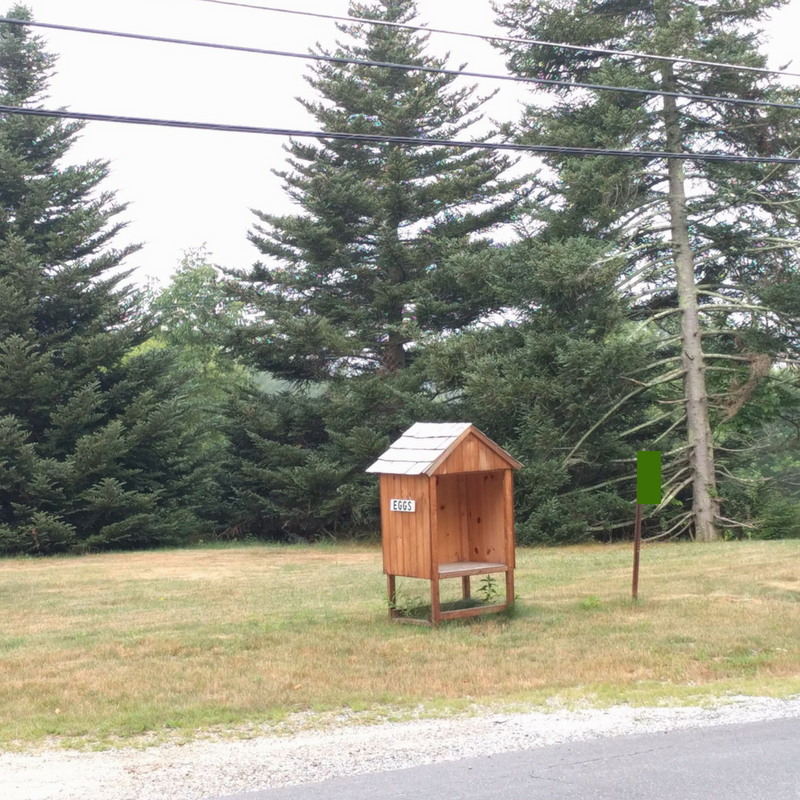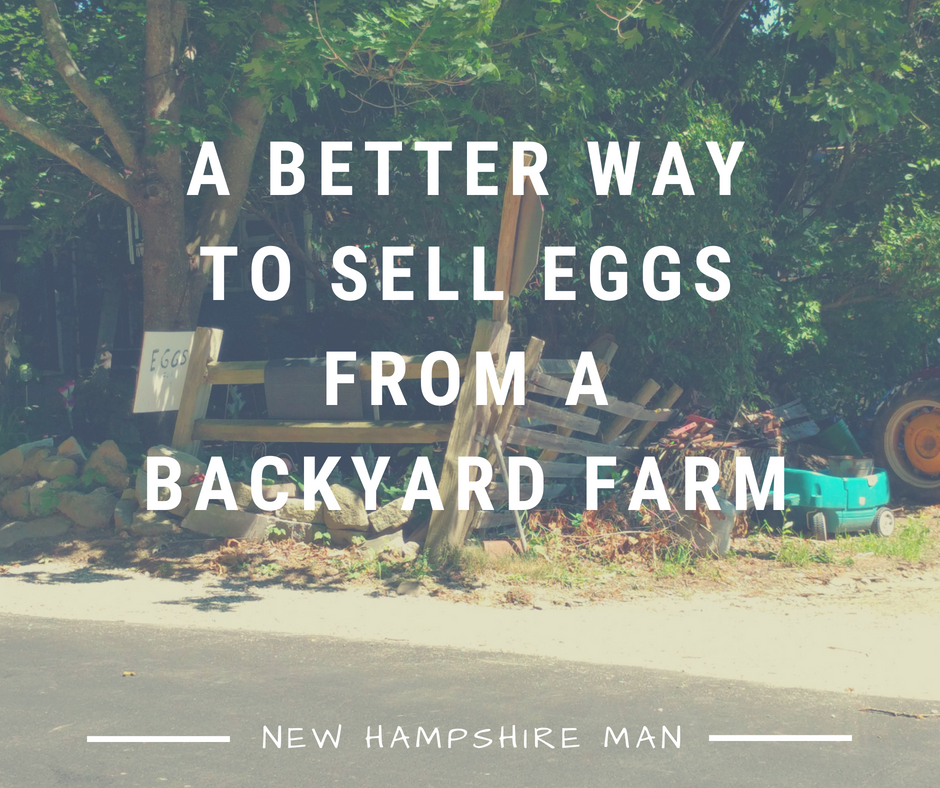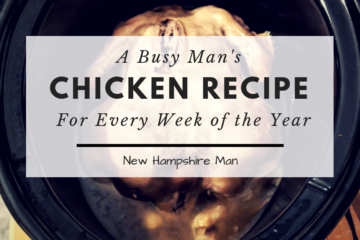I see these all over the place.
People selling eggs on the side of the road reading ‘Eggs’ with everything from a cooler to a little hut. I truly respect the people who are growing an abundance of food and trying to make a few bucks to offset the cost of keeping chickens, but I’d like to offer that I’ve found a better way to do it.
Let me explain.
Chickens are Machines, but Not Really
First, a super quick background for those who have never kept chickens. The average chicken lays about an egg a day, for a few days, and then takes a day off. It takes them roughly a year to start laying, then they’ll lay heavily and taper off as the years go by. After about 3 years of laying they’ve pretty much tapped out.
Furthermore, the frequency of hens laying eggs is also dependent on the number of hours of light in a day, so as the days get shorter (winter) they lay fewer eggs than in the spring and summer.
For reference, my flock is somewhere around 18 hens strong. Somedays we could get up to 17 eggs a day, but the average in the spring and summer comes out around a dozen eggs a day. As we rapidly cruise through summer and into fall, I expect that number to drop, and to keep dropping pretty significantly as we roll into winter.
The takeaway from this intro is that backyard farmers have a variable rate of egg production. This is evident by the hit-or-miss nature of these roadside coolers. More often than not, when I drive by, the sign is not out, or there’s a – Sold Out Today – sign on the cooler.
The Problems With This System
So now let’s put ourselves in the shoes of the consumer. I really want fresh eggs, those grocery store eggs are flat and gross. I want them so bad I’m going to cruise over to that place where there’s a cooler outside, but, I wonder if there will actually be any eggs out. Ya know what, I’m not going to waste my time, it’s just some eggs. BUT, if I happen to be driving by and the sign is out, maybe I’ll stop and grab some.
Ah shoot. I don’t have any cash on me! Dagnabit. Maybe next time.
As a seller of goods entering a relatively saturated market, we have to stand out. Mediocrity is failure. Furthermore, what do I do if I don’t sell my eggs? Put them back out tomorrow? How long are farm fresh eggs fresh?
Here are the significant issues with this system:
- Customers never really know when there will be eggs available, unless they take the time to study the farm routine.
- Producers never really know if their product will sell.
A Better Way to Sell Backyard Farm Eggs
It’s super simple. Think of it as an egg share, or a CSA, but just for eggs. Somebody buys in, commits to buying a dozen eggs a week, and pays a monthly fee.
I feel like I’m supposed to use more words to explain that, but it’s really that simple. Advertise once, sell eggs forever.
How I Make This Work
The method I used to make this work ended up fine, but I’m going to offer you a better way, too.
Some background: for years we had a small flock, 5 to 8 birds. They covered the family needs and in the heavier months left us a few dozen to give away. Then I discovered how to put chickens to work, and since I had space for more birds, I began wondering if I could sell enough eggs to cover the cost of keeping chickens. The answer appears to be yes (we won’t truly know until the end of the year).
Related: Putting Chickens to Work
Here are some things I consider to be keys to our successful egg venture so far:
- Finding an egg buyer – obvious, but worth stating.
- Feed Rationing – I used to keep the feeders full all the time. Totally unnecessary, especially with the next bullet.
- LOTS of outside space – I don’t ‘Free Range’ because they make a mess of my garden and poop on everything. I DO give them way more space than they need. I fenced in a large portion of my field for them, so much so that they haven’t even reached the fence yet. This is a great way, if you have the space, to get the benefits of free range (exercise, freedom, sun, food) while also still offering them protection from predators and personal sanity in the garden.
With the cost neutral model in mind, we expanded our flock to about 18 hens and 4(!) roosters. We now average about 12 eggs a day. Once we had a consistent overproduction of eggs we put a note on Facebook looking for someone to commit to picking up a dozen eggs a week for $15 per month. With good fortune two people answered the call. One person takes one dozen a week, the other takes two dozen a week, so we make $45 a month in eggs.
Each person has a designated pickup time during the week, and we just put the eggs in a cooler with an ice pack in the morning, and they pick them up on their way by. Some pay cash, some pay Venmo. No signs, no marketing, nobody knows but you and me.
Fifty pound bags of feed cost about $15 so we’re selling enough eggs to cover 3 bags of feed a month, and in the summer months, that’s more than enough and will hopefully offset the reduced production and increased feed usage in the winter.
Function Stacking the Hell Out of This System
All that is fine and well, but this is a systems approach to selling backyard eggs, so let’s get into some function stacking.
Function stacking is a common study in permaculture of finding ways to add benefits onto what you’re already doing with little or no additional input.
Building Relationships
The thing that I really like about this model is that I’m working with the same people every week. We get to know each other, we grow to trust one another. Should there ever be an issue with quality, it’ll be addressed quickly and thoroughly. If they ever forget to pay, it gets mentioned and corrected immediately. That said, if you decide to go this route, be confident in picking the right people.
In addition to the eggs, the relationship opens opportunity to market other products. I haven’t pressed this yet, but as the garden is coming in it’s got me thinking that if we ever want to grow our marketing into veggies and fruit, these are the first people I’ll be talking to.
Most good things must come to an end, so in the event they no longer need eggs, perhaps because their own flock comes into production, they can at least serve as a reference to future customers, and at best do our marketing for us to help find someone to fill the void.
Lastly, as the production wanes in the off season our customers will be prepared for the downturn and will hopefully be right there to pick back up the following spring.
Start a Composting Relationship
I’m nuts about composting with chickens, in my opinion, it’s the only way to go. They just destroy kitchen scraps, which supplements the feed bill, and gets turned into high nitrogen, compostable fertilizer.
Once you build that relationship, throw some more crazy on the scene and get into a compost swap. I have this going with one of my customers now. When I give them eggs I also give them a clean 5 gallon bucket with lid. When they come to get their eggs they drop off a 5 gallon bucket with kitchen scraps. More supplemental feed for my chickens, less trash to the dump, and it gets my friends out of having to compost without chickens.
In exchange, I’m be happy to hook them up with a few bags of high quality, chicken generated, compost.
Everyone wins, even Earth.

Driveway Hustle’s: Dropbox for knife sharpening, cooler for egg share, compost bucket for community composting.
Always Marketing
I’ve structured my system so that we still, usually, have a dozen a week to giveaway. Foremost, it just feels good to have something to giveaway every week. Maybe it’s to say thank you to someone who has been kind to us, or maybe it’s just a way of extending kindness.
Man. It’s just so nice to give people things, and so far, everyone has been very appreciative.
So appreciative, in fact, that many have said, ‘Hey, thanks for the eggs, if you ever have any extra we’d be happy to buy them.”
When that happens, I log it into memory. Should I need a new Egg Share customer, I have a list to work through.
If you’re just getting into the egg share thing, this is the approach I’d start with.
The ol’ first-one’s-free model.
Let’s Recap
First, hat tip to all the people who are putting in a little hustle out there to provide high quality food to their community.
Second, a better way to swing eggs is to establish the right number of relationships so that demand is just about always at supply.
Third, once those relationships are established, they can be grown to make everyone’s lives perpetually better.
I hope you’ve enjoyed this systems approach to selling eggs from a backyard farm. If you’re on the customer end of this equation, drop a little note in the cooler the next time you get eggs to see if you can grow a relationship with the farmer.
If you’re interested in more ways to apply systems thinking to achieve personal freedom through purposeful lifestyle design, please subscribe to my newsletter.
Be well,
NHMan
[sibwp_form id=2]




